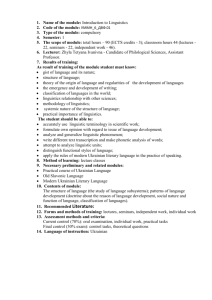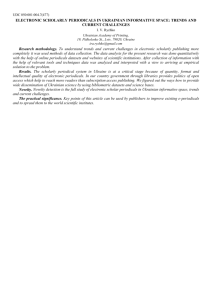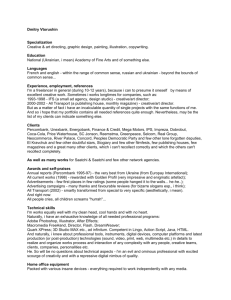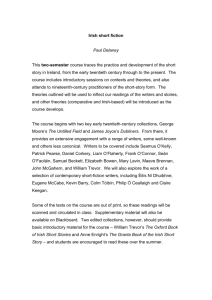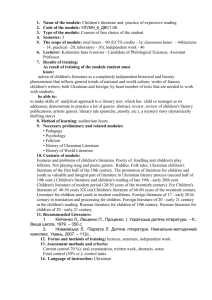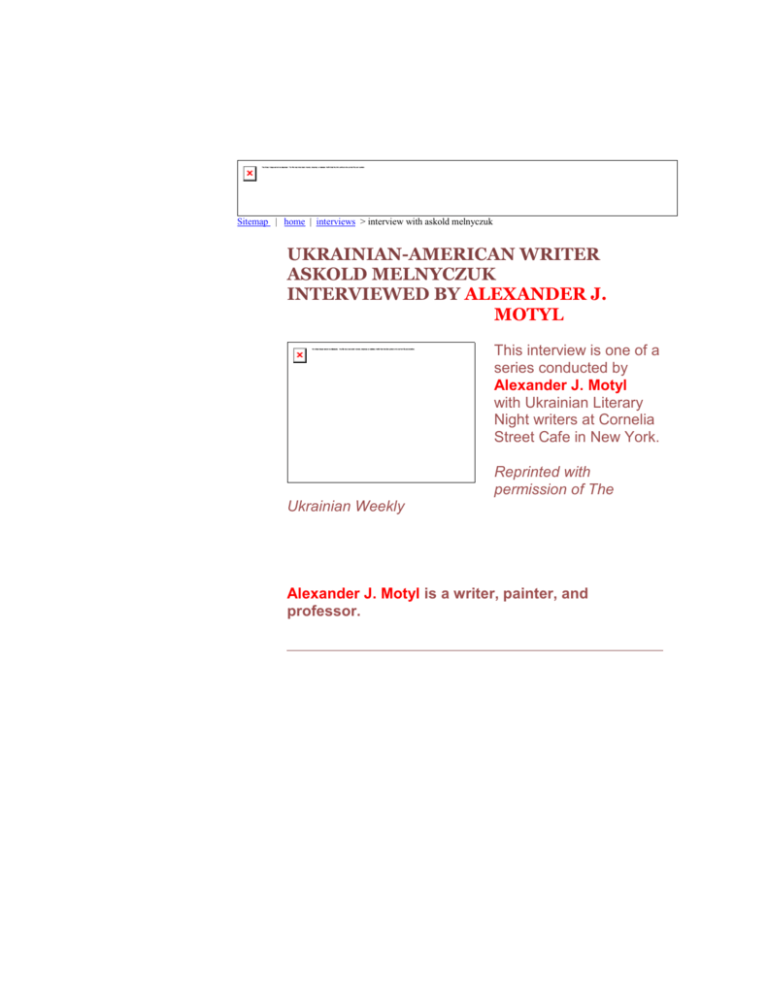
Sitemap | home | interviews > interview with askold melnyczuk
Home Page
Bookstore
UKRAINIAN-AMERICAN WRITER
ASKOLD MELNYCZUK
INTERVIEWED BY ALEXANDER J.
MOTYL
This interview is one of a
series conducted by
Alexander J. Motyl
with Ukrainian Literary
Night writers at Cornelia
Street Cafe in New York.
Submissions
Newsletter
Interviews
Readings
Reprinted with
permission of The
Ukrainian Weekly
Workshops
Fundraising
Contact Me
Links
Alexander J. Motyl is a writer, painter, and
professor.
Askold Melnyczuk, one of the leading fiction writers in
the United States, is author of What Is Told,
Ambassador of the Dead, and the just published novel,
The House of Widows (Graywolf Press). According to
Jhumpa Lahiri, "Brisk, lyrical writing and a winning
narrator make The House of Widows irresistible. A son's
quest to understand his father's suicide, and so to
excavate a family history extinguished by the exigencies
of the new world, make it exceptional." Melnyczuk is
interviewed by Alexander J. Motyl, professor at Rutgers
University and author of several academic books and
two novels.
Motyl: Your latest novel, The House of
Widows, has just appeared and received
terrific reviews. Tell us how you came to
write it.
Melnyczuk: The House of Widows has twin roots. The
kernel of the novel came to me while reading the
(Ukrainian) literary critic Yuri Luckyj's memoir, At the
Crossroads. In one paragraph he speaks about serving
as a translator for the British military as they
interrogated Soviet prisoners-of-war, as well as
deserters from the Soviet army, in Braunschweig,
Germany. The soldiers largely cooperated with the
British because they thought they'd be allowed to
repatriate to the west. Instead, after getting what
information they could from them, the British returned
the soldiers to the Soviet army. Many of them were
subsequently executed or exiled. And Luckyj, who had
by chance wound up in England at the start of the war,
found himself in the morally intolerable position of
participating in this duplicitous project. He knew he was
sending many of his countrymen back to certain death
and he tried explaining this to his superiors, to no avail.
One of the chapters of The House of Widows uses a
sentence from his book as an epigraph: "Was I
completely unable to stop this terrible traffic in human
lives? At first it seemed so…."
Luckyj's passage occupies no more than a paragraph or
two in his memoir, but it stayed with me. I tried
imagining how this must have felt for a kid of no more
than nineteen or twenty, whose own father had already
been arrested by the Soviets, how helpless he must
have felt.
Anyway, years after reading this I began working on a
book about a man who has a similar experience and
who eventually commits suicide as a result of all that's
set in motion by his early betrayal. The chapter, written
from the Ukrainian-British soldier's point of view, came
to me in one afternoon's work-unusually for me as I tend
to rewrite endlessly and fall into the category of the
writer as word-squeezer. But then I console myself that
that phrase was coined by my literary hero, Gustave
Flaubert.
That part of the novel which considers the sex trade is,
and not just by the way, intended as a reflection on the
implications of an unfettered free market in which
humans have long been treated as commodities.
The other moral thread of the story appeared years
later, while I was traveling through Germany and Austria
on a book tour for the translation of my first novel. In
Stuttgart, after a (rather poorly attended) reading,
several of us went out for dinner. Present was a young
Caribbean woman who said she was working with
American soldiers stationed in Stuttgart who were either
deserters or trying to get Conscientious Objector status
to keep from being sent to fight in Iraq. She said there
were some eight thousand young American men and
women around the world trying this gambit. I hadn't
heard about the phenomenon. Back in the States I
asked the great American historian Howard Zinn about it
and he said he'd heard such stories but didn't have any
reliable headcount. Body counts aren't the only thing our
military avoids. This was a little while after the Abu
Ghraib scandal broke; after some of the atrocities
committed by our soldiers in Fallujah had come to light.
Again I began wondering about the implications of thisnot about committing the atrocities themselves, or about
deserting, which raise rather different moral questionsbut about what it meant to know, to be given definitive
information, about war crimes. What responsibility did
the average, only moderately engaged citizen have?
Where did his first allegiance and responsibility lie?
Should a citizen conspire with his government in
covering up the truth of wartime atrocities? What good
would it do to let the world at large know about them?
Whom might it help? Whom might it harm?
Motyl: What answers did you come up
with?
Melnyczuk: I was, as I said, interested in the position of
the more-or-less average citizen and not of the active
perpetrator of the atrocity because that was the position
I feel many of ourselves find ourselves in. We've read
and heard stories about actions we'd never be able to
sanction under normal circumstances. Don't we have a
moral imperative to do what we can to let others know
about them? Here I imagined what it might have been
like to know about the Holodomor or the Holocaust while
they were underway. Didn't any honest woman or man
possessing privileged information about these crimes
against humanity have an absolute obligation to act on
them? If you see someone being murdered on the street
in your neighborhood, aren't you obliged to do
something? What, in our global village, are the
boundaries of our neighborhood?
Motyl: Those are exceptionally
demanding moral claims.
Melnyczuk: I know. Of course we are all steeped in
"mitigating circumstances." We have our own lives to
attend to, our own daily battles to struggle through. How
much risk should a whistle-blower assume? What kind
of risk were we talking about anyway?
In this context I remembered the phrase "the good
Germans," which has enough currency to serve as the
title of a popular film and which is an ironic reference to
the average citizen's quiet complicity in his
government's criminal behavior. Are we, American
citizens, suddenly in that position ourselves?
So many other questions follow from this. For example,
isn't "criminality" a relative concept defined by social
institutions, courts, and governments? Or was there a
deeper, more reliable moral ground for asking this
question? Here we skirt dangerously close to
metaphysics….
Motyl: How does a novelist answer these
moral questions?
Melnyczuk: A novelist's way of examining such
questions is by observing the behavior of his characters,
by learning from them how they act in the particular
circumstances in which they find themselves trapped.
Fiction, the novelist John Gardner observed, is an
ancient mode of thought. Story-telling isn't simply a way
of passing the time-it's another way of trying to
understand the human meaning of time itself.
Motyl: In addition to morality, all your
novels explore history and identity-and
especially Ukrainian history and identity.
It's hard to avoid concluding that these
issues are of deep emotional and
spiritual importance to you.
Melnyczuk: History and identity are endlessly
interesting. Another way to think about them is as cause
and effect. A child is born into circumstances it did not
create. It is given a name by a mother and a father who
both have their own past bearing down on them. They
live in a country that's at peace or at war. They grow up
amid great wealth, or poverty, or somewhere in
between. At the same time they have something in them
that doesn't seem to depend on external matters, on
causes and conditions. What is that? The clash or
meeting or dance between that inner self and external
circumstances creates what we call character. History
and identity define a part of the self-but all of us
recognize we share a humanity that transcends any
humanely created boundaries.
My own identity included the terms Ukraine, the Famine,
the Holocaust, and all the abundance, beauty, and yes,
ugliness, of New Jersey in the second half of the
twentieth century bleeding into the twenty-first. Each
term in the above sentence can be combined in a
thousand different ways-writing fiction allows me to
perform chemistry experiments using them as
ingredients.
Motyl: What did you conclude from these
experiments?
Melnyczuk: What I've found is in many ways obvious:
that the elements interact differently in every individual;
that there is enough overlap in some cases for people to
accept certain group affiliations; and that there are
enough differences so that no generalization about any
group can be absolutely true and consistent. Where a
sociologist or even a historian might be eager to identify
and stress common tendencies and broad categories,
the fiction writer, like the poet, chooses instead to stake
his claim to truth on specificities. Creating my
characters, I know they don't stand for or represent
anyone but themselves.
You know, I grew up in the States at a time when certain
generalizations about Ukrainians were commonplaces
both in the media and the classroom. They left me as
furious as generalizations about African Americans or
Hispanics-more, maybe, because I naturally felt
implicated in the often ugly broad stereotypes. On the
other hand, if readers are to find them interesting or
believable as characters, they will need to see
something of themselves in these fictive beings.
Characters earn our sympathy when we can see
something of ourselves in them, no matter where we
come from.
These days I confess I love reading history at least as
much as, or maybe more than, fiction. Well-written
history so often reminds me that there are more things
between heaven and earth than are dreamed of in our
philosophies and that our imaginations have to work
overtime to begin to approach the complexity of "reality."
Motyl: How do you write your novelswith a clear outline in mind when you
begin, or with a general sense of plot and
direction and character?
Melnyczuk: An image, an idea, and/or a character plant
themselves spring up, usually without invitation. Most
wither after a scribbled page or two. Occasionally a
seed finds fertile ground and gradually grows into a
story; the gestation process can take years. Did you
know that an amaryllis seed is the size of a dime and
that it takes seven years for it to become that fat bulb
sold in supermarkets across the country, ready at last,
to bloom?
Scenes gather slowly; I revise and revise. I once spent
three years writing 20,000 pages of drafts for a novel
that never came together. But that is part of the job
description. Then, every so often, a story or a chapter
(or a poem) comes quickly and I grab them with a
prayer of thanks.
My wife Alexandra Johnson, a far finer writer than I
(fortunately she writes non-fiction), reads everything I
write. I shudder to imagine what horrors I'd send out into
the world if it weren't for her generously critical gaze. I
shudder anyway.
Motyl: You began writing as a poet, didn't
you?
Melnyczuk: Yes, like so many fiction writers, I began as
a poet. I still read a lot of poetry, and some of my best
friends are poets. But I found that in my poetry I wasn't
able to find a way to get at certain questions and certain
material that kept gnawing at me-fiction offered a
release into a larger realm of imaginative possibility. Yet
I value poetry immensely for its ability to get at
essentials, for the way it probes the implications and
possibilities of language itself. As a rule we use
language loosely; we take it for granted. In many ways,
of course we should and we must. E. M. Forster
describes how surprised a friend of his was to discover
that she had been speaking "prose" her whole life. In
fact, all of us speak prose; very few of us speak poetryanymore.
Motyl: How did growing up Ukrainian
influence your writing?
Melnyczuk: Both my mother and father are great
readers. While my father prefers to immerse himself in
history, politics, or economics, my mother still, at eightyseven, reads deeply and widely in what was once called
belle-lettres. From childhood she fed me a diet that
included among its staples not only all the Ukrainian
classics-Taras Shevchenko, Ivan Franko, Lesia
Ukrainska, Olha Kobylianska, etc.-but also the great
Europeans: Rilke, Lagerloff, Hamsun, Mann, Hesse,
Gide, Rolland, Zweig. I was ten when she gave me
Rilke's Stories of God, a book inspired by his travels
across Ukraine (which he of course called Russia).
I loved reading (and memorizing poetry) from childhood
on. When I was six I recited Shevchenko's Poslaniye
before two hundred patient auditors at the Ukrainian
National Home in Elizabeth, New Jersey. Never mind
that I didn't understand a word-not a word-of what I was
saying. The roar of the crowd made it seem worthwhile.
The habit stuck. And in high school literature became a
lifeline, offering a secret company of kindred spirits
when none were to be found in one's immediate
neighborhood.
I still remember the morning-it was four a.m., July, 1972when I finished reading Gabriel Garcia Marquez's A
Hundred Years of Solitude. I put the book down on my
desk, went out into the quivering predawn stillness,
looked up at the stars, and saw them as if for the first
time. Literature re-enchanted the world for me. It
reminded me of what most children know, and
adolescents too often forget-that we live in a world
steeped in mystery, and that anyone who claims to
understand it is posing, deceiving both himself and the
rest of us. Socrates' main claim to fame was the
willingness to admit that he knew nothing. Gaugin's
most famous painting is aptly titled: Where do we come
from? What are we? Where are we going? Art is
possible because there will never be a definitive answer
to these questions.
Motyl: Which writers influenced you
most?
Melnyczuk: So many writers enlarged both my sense of
the world and my awareness of art's possibilities. A
short list of predecessors might include: Saul Bellow,
Gregor von Rezzori, Ernest Hemingway, Rilke, Hamsun,
and Alain-Fournier.
At the same time, one's contemporaries and peers can
become catalysts in one's development, and I was very
fortunate to have come to Boston at a time when the city
was enjoying something of a renaissance. I profited
enormously from the company of friends like Sven
Birkerts, Tom Sleigh, Derek Walcott, Seamus Heaney,
Tom Bahr, Ha Jin, Jason Shinder, and others-in many
cases they showed me just how high the bar stood; their
example was an inspiration to keep pushing at the limits
of what one could do. They were courage-teachers, too.
Motyl: What led you to found Agni-one of
the most prominent literary journals in
the United States?
Melnyczuk: Agni was founded as an underground
newspaper in Cranford, New Jersey by a group of
grumpy, pissed-off, and bewildered adolescents. My
father loaned us $35 for a mimeograph machine and we
began running off our little samizdat venture. It's funny,
my father was both strict and conservative but he was a
deep believer in freedom of speech, and so he
supported the venture despite the trouble it got us into
with school authorities. I will always be grateful to him
for that, along with so many other things.
When I went to college I took the name of that
newspaper and slapped it onto a literary journal I printed
up myself. From 1972 on, I took the journal with me
wherever I went. In 1979 I left the States to travel in
Europe and the journal was kept alive by Sharon Dunn.
Later I took it up again and stayed with it until 2001,
when I left Boston University to teach at the University
of Massachusetts. By then I had fully tasted the
pleasures of editing. Along the way the journal acquired
a reputation-and it provided an enormously useful lens
for viewing the contemporary literary world both here
and abroad.
Motyl: Agni was also remarkable for
publishing so many Ukrainian writers.
Melnyczuk: That's right. My position as editor also gave
me a ready venue for publishing Ukrainian literature in
translation during a time when many American
intellectuals claimed no such thing existed. But it's
harder to argue with facts on the ground than with words
in thin air. So Agni became a showcase not only for my
own translations of Mykola Rudenko and Ivan Drach
and Vasyl' Barka but also those of Michael Naydan and
Virlana Tkacz and Wanda Phipps and later Jim
Brasfield's translation of Oleh Lysheha made its
appearance in our pages, along with Halyna Hryn's
translation of Oksana Zabuzhko.
It was working with Agni that brought Ed Hogan to the
Ukrainian Research Institute at Harvard where he
discovered a new literature that inspired him to publish
the ground-breaking anthology From Three Worlds.
By the way, there's a nice irony in that the journal now
occupies the offices of the defunct Partisan Review,
once one of the America's leading literary-political
magazines and which was founded to serve as a
mouthpiece for Trotskyites. Who knows who'll one day
occupy Agni's offices? The world turns….
Motyl: How did you get involved with the
writing scene in Ukraine?
Melnyczuk: In 1990 I received, out of the blue as it were,
an invitation to attend a poetry conference in Kyiv called
Zolotyy Homin. That was an axial year in Ukraine's
history-I happened to be there when the statue of Lenin
was torn down from in front of the Opera House in Lviv.
In fact, my first day in Lviv I went to look at the Opera
House, where my mother used to go when she was a
student at Ivan Franko University, before the war
aborted so many lives, when suddenly I saw hordes of
people pouring into the square. Before I knew it I was
pressed flat against the door of the theatre, listening to,
mirabile dictu, a speech by Father Andrij Chirovskyj,
whom I had last scene at Plast Camp some twenty
years before (the rest of my Plast adventures belong in
the memoir I'm currently writing).
At that conference I met not only those Ukrainian writers
whose work I'd translated, such as Drach and Rudenko
(on whose behalf I'd written letters for Amnesty
International-I bet Agni was the only underground
newspaper in America to run an editorial about the
Helsinki Human Rights group and Rudenko), but also
important émigré writers like Bohdan Boychuk, Bohdan
Rubchak, and Yuriy Tarnawsky. Moreover, I met the
new generation of writers, and they were hugely
exciting. You could tell at once they were onto
something big. The twenty-something Oksana
Zabuzhko was brash, illuminating, even intimidating;
Yurko Andrukhovych was quieter, more inward, but you
could tell that they, along with Petro Midyanka and
Sashko Irvanets and Viktor Neborak and others, were
breaking new ground in their culture. You sensed the
borders of the motherland would not contain them, their
spirits were already reaching out to places they'd never
been. And now they're nurturing a new generation of
writers and artists to continue the conversation, this time
on the world stage.
Motyl: Who are your current favorites?
Melnyczuk: I've been moved and impressed by the
poetry of Marjana Savka, Serhii Zhadan (through the
Tkacz-Phipps translation), and Vasyl Makhno. Recently
I was blown away by the emotional force of Marjana
Sadowska's singing. It's clear the culture's on solid
ground, and is now deeply embroiled in a vigorous
conversation with the rest of Europe, and the world.
Now if only these writers were to find the support both in
Ukraine and among the Ukrainian émigré community
enjoyed by, say, German or Irish writers, well, then we'd
have more to talk about.
Motyl: Are you in touch with these
writers?
Melnyczuk: I've stayed in close touch with Zabuzhko,
have intermittent contact with Andrukhovych, recently
came to know Marjana Savka-I've no doubt the
conversations will continue-unless one of us becomes a
Trappist….
More recently, in 2003, I attended a conference in Kyiv
on American literature organized by Dr. Tamara
Denisova. Walking into a classroom in Shevcheniko
State University and listening to young (some
remarkably so!) scholars delivering papers-in English!on Jamaica Kincaid and William Styron and others, was
deeply moving. They underscored something that's
often overlooked when Ukrainian writers complain
they're slighted in the West, and that is that culture is a
conversation, not a monologue.
Motyl: What's your next project?
Melnyczuk: My current project is a memoir, which
includes an account of my time living at the Studite
Monastery outside Rome… and maybe a few words
about Plast, too. But maybe not.
Copyright © 2005-2008 ČERVENÁ BARVA PRESS LLC All Rights Reserved



